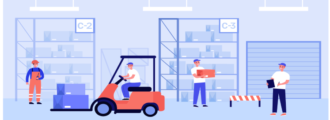Blockchain technology has emerged as a transformative force across industries, revolutionizing how businesses execute critical transactions and collaborate in the interconnected digital world.
Oracle Blockchain lies at the forefront of this innovation, providing a comprehensive platform with the tools and capabilities to harness distributed ledger technology (DLT) power. By leveraging a transparent, tamper-proof environment for recording and verifying transactions, organizations across industries can streamline processes, enhance trust, and drive greater efficiency in their operations.
In this article, we discuss the key components, features, and benefits of Oracle Blockchain, exploring how it enables the efficient transfer of internal and external data and improves interactions with traditional systems.
How Does Blockchain Technology Work?
Blockchain essentially refers to a comprehensive ledger of decentralized data that enables users to securely share transactional data from multiple sources and leverage unique identifiers to chain together shared blocks in cryptographic hashes.
A blockchain network acts as a historical record of core data transactions, connecting each block to the previous block in sequence and assigning a unique identifier to each transaction for better data accuracy and consistency across the peer-to-peer network. By leveraging blockchain to link transactional data, organizations and trading partners can improve data access and transfer across systems, often referred to as third-party, consensus-based trust.
Blockchain technology does not require additional intermediaries or overhead, but rather it helps organizations reduce the cost of critical business transactions among parties and enables participants to maintain an encrypted record of each transaction.
With no centralized location for all transactions and their associated data and limited points of vulnerability, organizations can maintain better security and availability for each real world data source.
Three Types of Blockchain Technology
Here’s a closer look at the three main types of blockchain and how they work:
Public
Typically employed by most cryptocurrency types, public blockchain provides a public, permission-less blockchain network governed by predefined rules or consensus algorithms where anyone can participate without restriction.
Private/permissioned
Private blockchains, like the Oracle Blockchain Platform, allow organizations to control access to blockchain data, ensuring only authorized users can access specific data inputs and transactions.
Federated/consortium
A federated blockchain network involves data mining processes controlled by a preselected set of nodes or a number of key stakeholders to protect data from unauthorized access.
Common Challenges Resolved with Enterprise Blockchain
- High reconciliation costs: Siloed data across divisional and organizational boundaries often results in higher reconciliation costs and a greater impact on existing enterprise operations.
- Risk of errors and fraud: Collaboration among trading partners and participants across the enterprise ecosystem can lead to a lack of reliable data and an increased risk of human error.
- Lack of traceability: The inability to track physical and digital assets effectively and create comprehensive audit trails puts organizations at risk for regulatory non-compliance.
- Intermediary issues: Connections with external participants and trading partners can cause issues with cost, risk, and delays from intermediaries and ineffective communication between parties.
- Lack of real-time data: Batch data updates contribute to a lack of real-time visibility across supplier, distributor, and customer networks.
What is Oracle Blockchain?
Oracle Blockchain Platform is a distributed ledger technology (DLT) solution designed to streamline and secure business transactions across various industries. It provides organizations with a scalable platform for building, deploying, and managing blockchain networks, enabling them to create transparent, auditable records of transactions and assets.
Oracle Blockchain Platform leverages blockchain’s inherent features, such as immutability, decentralization, and consensus mechanisms, to facilitate trust and transparency among multiple parties involved in a transaction or business process.
With features like smart contracts, identity management, and integration with existing enterprise systems, the Oracle Blockchain Platform empowers organizations to accelerate business processes, reduce costs, mitigate risks, and create new revenue streams through innovative blockchain-based solutions.
Key Components of Oracle’s Blockchain Platform
Oracle Blockchain Platform Cloud Service
The Oracle Blockchain Platform Cloud Service is a managed-permissioned blockchain network designed to help users quickly configure a Hyperledger Fabric, member-governed blockchain for real-time data sharing.
By leveraging smart contracts and trusted business networks, the Oracle Blockchain Platform Cloud Service empowers trusted transactions between stakeholders and facilitates comprehensive data monitoring across networks.
- Process automation through smart contract applications
- Private transactions across trusted business networks
- Integration with other enterprise applications and systems
Intelligent Track and Trace
With end-to-end visibility into existing supply chain networks and solid relationships between trading partners, Oracle’s track and trace functionality enables users to track, trace, monitor, and optimize business transactions and their associated data, items, assets, and documents.
- Pre-integrated blockchain technology for quicker deployment
- Effective tracking and tracing for the condition of specific products
- Reduced risk with decentralized systems
- Connection to other data sources and applications
Oracle Blockchain Platform Enterprise Edition
Oracle Blockchain Platform Enterprise Edition offers greater data privacy, enabling users to access a pre-assembled, on-premise blockchain supported by key virtualization hypervisors.
- Pre-built blockchain platform manager
- Oracle Blockchain console and DevOps APIs
- Oracle REST API for critical transactions, queries, and more
- Hyperledger Fabric blockchain foundation
- Identity management through OpenLDAP, Oracle Directory, and Microsoft Active Directory
Oracle Database Crypto-Secure Data Management
With tamper-proof features and intelligent crypto-secure data management capabilities for centralized data, financial transactions, chains of custody, and more, Oracle Database Crypto-Secure Data Management enables users to improve databased fraud protection across networks.
- Immutable tables: Permits insert-only SQL operations and prevents unauthorized internal changes, updates, deletions, and other modifications.
- User data signing: Enables the cryptographic signing of data inserted into private user data keys to prevent fraud by impersonators and other bad actors.
- Blockchain tables: Leverages cryptographic functionality to chain new rows of data to existing rows, detect any bypassed deletions or modifications, and prevent changes by hackers.
- Distributed table digest: Enables users to identify database rollbacks or illicit changes to gain and distribute an owner-signed cryptographic digest of each blockchain table.
Industry-Specific Use Cases
As companies become more reliant on data accuracy and availability in an increasingly connected enterprise landscape, the need for a solution that enables secure data sharing and transactions across siloed systems is greater than ever before.
Here are a few examples of how Oracle Blockchain technology helps companies across industry sectors achieve better data management and transparency:
Retail
- Trusted provenance information across the entire lifecycle of luxury products, such as diamonds, high fashion products, and more
- Connection to Oceanworks and Keep Sea Blue to improve traceability for recycled plastics used in manufacturing industrial and consumer products
- Single, unified platform for retail rewards programs linked across the enterprise ecosystem
- Intelligent inventory tracking and invoicing functionality to improve consistency and trust across the enterprise franchise landscape
- Sustainable sourcing of materials and end-to-end supply chain visibility for enhanced tracing between suppliers and reliable data collection
Public Sector
- Oracle blockchain-based replacement for fraud-attacking licensing processes and tax collection
- Verifiable chain of custody across agencies for full visibility into core custody changes
- Trackable artificial intelligence and machine learning functionality to improve the accuracy of governmental data and results
- Effective immigrant documentation and visa tracking
- Localized decision-making and voting for municipal initiatives by citizens abroad
- Multi-tiered grants distribution, tracking, and optimization
Finance
- Asset tokenization across wealth management and financial trading security services
- Instantaneous cross-border funds transfer for payments, remittances, and more
- Real-time updates for AML/CFT Watch/Sanctions lists
- Connection between insurance back-office systems and account reconciliation processes to eliminate manual reconciliation
- Automatic parametric insurance policy creation, issuance, execution, processing, and monitoring
Manufacturing
- Access to a decentralized repository of container carriers and ports to improve shipment tracking, cargo release, and interaction with trade finance organizations
- Secure B2B platform for SLA enforcement, inventory visibility, authenticity, and product geo-origin
- Optimization and predictive maintenance for repaired or replaced equipment
- Distributed ledger of intercompany purchase orders and invoices for effective intercompany billing and account reconciliation
- Advanced document management and exchange for trade logistics and blockchain-based documentation
How Can We Help?
Whether you need help deploying Oracle services across your enterprise landscape, navigating complex blockchain transactions between internal and external systems, or consolidating information from multiple reliable data sources, Surety Systems has you covered.
Our senior-level Oracle consultants have the skills and experience to understand your critical project needs, create effective action plans, and prepare your internal teams for long-term success.
Contact Us
For more information about our Oracle consulting services or to get connected with our team of expert consultants, contact us today.




